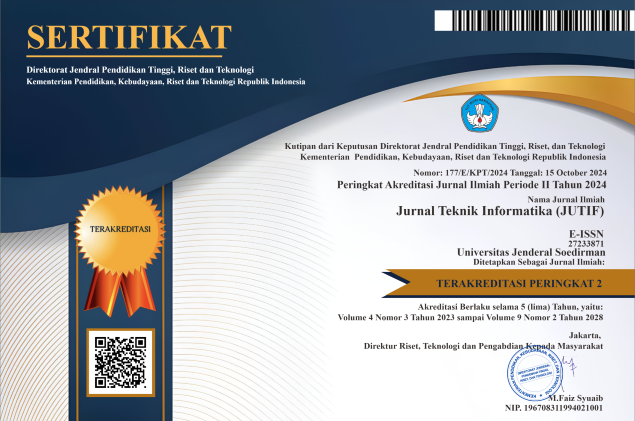ANALYSIS OF THE INFLUENCE OF BUSINESS INTELLIGENCE ON BEVERAGE SALES KONNICHIWA COFFEE USING THE METHOD EQUIVALENCE CLASS TRANSFORMATION
DOI:
https://doi.org/10.52436/1.jutif.2023.4.6.1552Keywords:
Business Intelligence, Data Mining, ECLAT, Konnichiwa Coffee, Small and Medium BusinessAbstract
Konnichiwa Coffee shop is one of the business beverage that sells various types of drinks. Determination of price discounts or product promotions sometimes doesn’t match what customers wants and needs. Another obstacle found was that there were no promotions for consumers who bought directly at Konnichiwa Coffee outlets. This causes less than optimal sales strategies and store promotion strategies. Determining menus that are often purchased simultaneously by consumers can be a reference for owners in determining promotional strategies. Therefore, this research was conducted to look for association patterns between menus that can implement business intelligence (BI) in the association rules method. One of the association rules algorithms is the ECLAT algorithm. The ECLAT algorithm is used because it is more efficient and faster in terms of time. The data used in this research were 214 products from 100 transactions with 26 types of drink menus. The resulting pattern refers to a minimum support value of 3% and a minimum confidence of 30%. This means that transaction data that has association patterns or that were purchased together is only 3% of the total transaction data with a confidence level of 30%. From the results obtained, the Java Latte, Kopi Latte and Sapporo Latte menus are the menus that are most often purchased together so they can be used as a marketing strategy for Konnichiwa Coffee.
Downloads
References
A. N. Rahmi, “Implementasi Algoritma Apriori Untuk Menentukan Pola Pembelian Pada Customer (Studi Kasus : Toko Bakoel Sembako),” Information System Journal (Infos), P. 14, 2021.
Syarli, “PERANCANGAN BUSINESS INTELLIGENCE SYSTEM PADA GUDANG FARMASI DINAS KESEHATAN KABUPATEN MAMASA,” Jurnal Keteknikan Dan Sains (JUTEKS), Vol. Vol. 1 No. 1, Pp. 1-8, 2018.
Suyadi, “Analisis Pengembangan Usaha Mikro Kecil Dan Menengah (UMKM) Di Kabupaten Bengkalis-Riau,” Jurnal Ekonomi KIAT, Vol. Vol. 29 No. 1, Pp. 1-10, 2018.
I. Suryati, “Pengaruh Ukuran Usaha Dan Sumber Modal Terhadap Penerapan Standar Akuntansi Pada Usaha Mikro Kecil Dan Menengah Bidang Jasa Atau Pelayanan Laundry Di Kecamatan Makasar Tahun 2019,” Jurnal Mahasiswa Akuntansi Unsurya, Vol. Vol. 1 No. 1, Pp. 1-13, 2021.
A. Halim, “Pengaruh Pertumbuhan Usaha Mikro, Kecil Dan Menengah Terhadap Pertumbuhan Ekonomi Kabupaten Mamuju,” Jurnal Ilmiah Ekonomi Pembangunan, Vol. Vol. 1 No. 2, Pp. 1-16, 2020.
V. K. Subroto, “Business Intelligencedan Kesuksesan Bisnis Di Era Digital,” Jurnal Manajemen Sosialekonomi (Dinamika), Vol. %1 Dari %2vol. 1, No. 2, Pp. 41-47, 2021.
N. M. E. A. Putri, “Implementasi Business Intelligence Untuk Menentukan Tingkat Kasus Covid-19 Di Indonesia,” Tingkat Kasus Covid-19 Di Indonesia, Vol. %1 Dari %2v. 10, N. 1, Pp. 143-152, 2021.
Berlin, “PENERAPAN BUSINESS INTELLIGENCE PADA CV. TANGGAMAS CHEMICHAL DENGAN METODE OLAP,” Jurnal Algor, Vol. %1 Dari %2vol. 2, No. 1, P. 57–65, 2020.
A. R. Oktavian, “Penerapan Business Intelligence Terhadap Data Penjualan Umkm Menggunakan Metode Algoritma Apriori Dalam Menentukan Segmentasi Pasar,” Jurnal Media Informatika Budidarma, Vol. %1 Dari %2volume 6, Nomor 3, Pp. 1740-1745, 2022.
P. M. S. Tarigan, “Implementasi Data Mining Menggunakan Algoritma Apriori Dalam Menentukan Persediaan Barang,” Jurnal Universitas Muhammadiyah Jakarta, Vol. Volume 8, No. 1, 2022.
D. V. Srinadh, “Evaluation Of Apriori, Fp Growth And Eclat Association Rule Mining Algorithms,” International Journal Of Health Sciences, P. 7475–7485, 2022.
Mardiansa, “Penerapan Data Mining Untuk Mengetahui Minat Siswa Pada Pelajaran,” Jurnal Multi Disiplin Dehasen , P. 10, 2023.
I. K. J. Arta, “Data Mining Rekomendasi Calon Mahasiswa Berprestasi Di Stmik Denpasar Menggunakan Metode Technique For Others Reference By Similarity To Ideal Solution,” Jurnal Ilmu Komputer Indonesia (Jiki), Vol. Vol. 5 No. 2, Pp. 1-15, 2019.
Thariq, “ANALISIS ASSOCIATION RULES MENGGUNAKAN ALGORITMA ECLAT PADA TOKO SWALAYAN,” Buletin Ilmiah Math. Stat. Dan Terapannya (Bimaster), Pp. Volume 12, No.2 Hal.171-178, 2023.
J. A. Jusoh, “Analysis Study On R-Eclat Algorithm In Infrequent Itemsets Mining,” International Journal Of Electrical And Computer Engineering (Ijece), 2019.
L. Zahrotun, “Penerapan Algoritma Eclat Untuk Menemukan Pola Asosiasi Antar Barang Di Aneka Sandang Collection,” Jurnal Riset Sains Dan Teknologi, Vol. Volume 7 No. 1, Pp. 37-43, 2023.
K. Amri, “Penerapan Data Mining Dalam Mencari Pola Asosiasi Data Tracer Study Menggunakan Equivalence Class Transformation (Eclat),” Jurnalnasionalkomputasi Dan Teknologi Informasi, Vol. Vol. 5 No. 3, Pp. 1-8, 2022.
I. F. Rozi, “Analisa Frequent Pattern Pada Data Penjualan Menggunakan Algoritma Eclat Untuk Menentukan Strategi Penjualan,” Jurnal Informatika Polinema, Vol. Vol 5 No 3, Pp. 136-140, 2019.
Sugiyono, “Metode Penelitian Kuantitatif, Kualitatif Dan R&D,” Dalam Metode Penelitian Kuantitatif / Prof. Dr. Sugiyono, Bandung, Bandung : Alfabeta, 2018, 2018, Pp. 523-526.
P. Mardatillah, “Penerapan Algoritma Equivalence Class Transformation (Eclat) Dalam Pencarian Adverse Event Obat Diphenhydramine,” Jurnal Restikom : Riset Teknik Informatika Dan Komputer, Vol. %1 Dari %2vol. 2, No. 3, Pp. 143-155, 2020.
A. Widyan, “Analisis Rekomendasi Produk Menggunakan Algoritma Eclat Berdasarkan Riwayat Data Penjualan Pt Xyz,” Jurnal Teknologi Dan Sistem Informasi Bisnis, Vol. 3, 2021.
R. L. Najmi, “Analisis Pola Asosiasi Data Transaksi Penjualan Minuman Menggunakan Algoritma Fp-Growth Dan Eclat,” Pekanbaru, 2023.



























